Attention all urban decision-makers! Did you know that you can do business without money?
Edited on
05 February 2020We all want urban services to be efficient, redevelopment exciting, civic events colourful and new urban initiatives really able to make a difference! But how do you do this when many European cities - especially after the hard-hitting crises of the last decade - lack funding, resources, knowledge and the connections that make such vibrant governing work? One answer may surprise you. We can turn to our corporate and business communities. Because there is something called Corporate Social Responsibility (CSR).
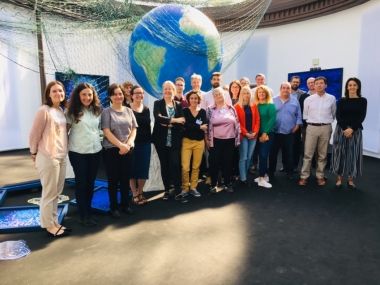
CSR, in short, can be broadly defined as the "the responsibility of enterprises for their impacts on society" (European Commission, 2019). The idea is that enterprises integrate social and environmental concerns into their mainstream business operations on a voluntary basis. So they respect human rights wherever they produce their goods and services, they treat staff well, don’t pollute the environment and are not corrupt. In a nutshell: responsible business. Sounds familiar, but where is the link to our cities, communities and civic services?
This is where our brand new URBACT Action Planning network comes in. Fancily named ‘CITIES4CSR’, this 10-city pan-continental project is in a unique position to explore in practical ways how CSR can make a difference to our urban societies. Using the proven URBACT-principles, methods and tools - it sets out to support building, testing and implementing ‘comprehensive municipal strategies to foster and stimulate corporate responsibility in urban areas’. In other words, we aim to work towards realising a new vision across our European continent: cities not as places where local administrations rule top-down, but as sites where government and business are sharing urban responsibilities! We want to show how Corporate Social Responsibility can be lifted to a new level: Corporate Urban Responsibility.
What makes our approach somewhat unique compared to other networks is the fact that what binds our cities together is not foremost a concern with changing one particular urban outcome. Rather, it is all about building purpose-designed local CSR-toolboxes that help to challenge the local status-quo in very different policy realms. Just like a building company may use its machinery, people, experience and know-how to build a train station in one city, a TV-tower in the next one and a shopping centre in another city, our joined efforts may trigger beneficial transformations in different policy areas in different cities. Actually exactly there where cities feel need is most pressing.
So value could be added in urban regeneration, environmental protection, social cohesion or educational policies; you name it. The glue between cities, and the common concern, is the focus on how the aspirations, resources and leadership of the local corporate sector - in partnership with government and other stakeholders – will be the in the heart of change.
Corporate social responsibility is surely not a new concept. Academic debates link the ascent of CSR to five societal transformations: more affluent societies, growing sustainability concerns, intensified globalisation, stronger role of the media and the rise brands (Chandler and Werther, 2013). CSR can be implicit, embedded in the values, norms and rules of societies, or explicit, encompassing voluntary programs and strategies by corporations based on their discretion (Matten and Moon, (2008). And, across Europe there seems to be a CSR-gap as more progressive policies in Western Europe, Scandinavia and the Anglo-Saxon countries have not been equally shared by governments in Central and Eastern Europe (Steurer, 2015). µ
The good news is that we don’t have to wait for business to come forward in urban affairs; local governments can be incredibly proactive. Our toolboxes are already filled with a variety of proven CSR policy instruments, from awareness-raising that can spread the word about CSR to procurement strategies that require suppliers to meet certain environmental and social criteria. So no reinventing the wheel. Yet, finding the right CSR-solution may mean confronting deep-seated trust issues between public authorities and corporate actors and differences in terms of everyday languages, work habits and planning horizons. In other words, we should not be surprised to encounter gaps of various kinds, misconceptions and stumbling blocks in our project.
So who are the ten cities that take on this challenge? Lead Partner is Milan (Italy), a city with profound experience in managing European projects. Partners are: Sofia and Vratsa from Bulgaria, Kekava municipality from Latvia, Rijeka from Croatia, Molina de Segura from Spain, Guimarães from Portugal, Budaörs from Hungary, Bratislava from Slovakia and Nantes Metropole from France. The network covers different geographical parts of Europe relatively well, and incorporates varying sizes of local government. Excitingly, we are proud to have in our midst the 2019 European City of Innovation (Nantes) and the 2020 European City of Culture (Rijeka).
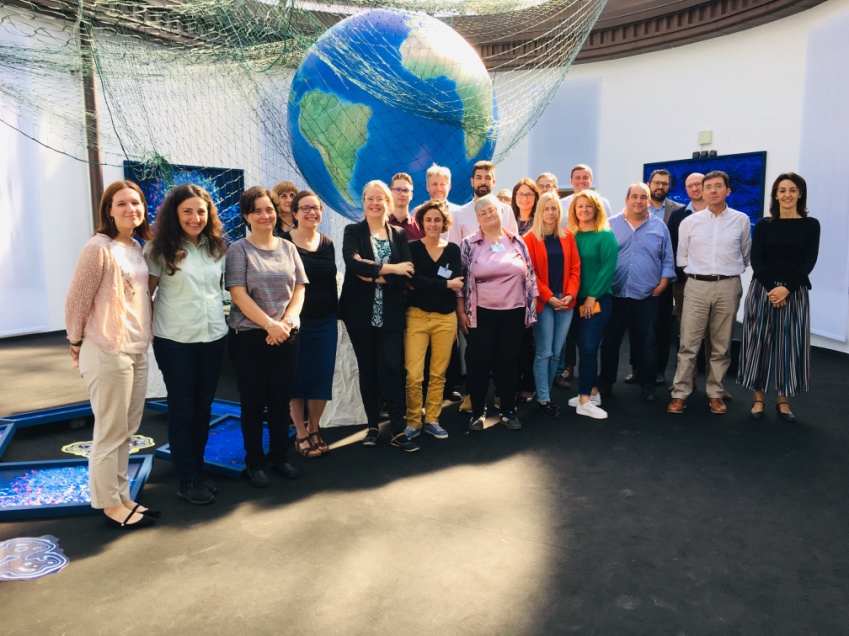
Our network has plenty of opportunity to build institutional bridges. For example with the United Nations Global Compact that constitutes the world's largest corporate sustainability initiative. Its urban arm, the UN Global Compact Cities Programme, promotes city and regional governments collaborating with the private sector and civil society in order to address complex global challenges on the local level; implementing the so-called Melbourne Model. CSR-initiatives can also be directly related to the European Urban Agenda and the European Commission. Finally, CSR Europe’s vision is that by 2030 the European urban population, or three quarters of the total population, will be living in sustainable cities that will provide them with economic opportunities, reliable infrastructure and high standard of living.
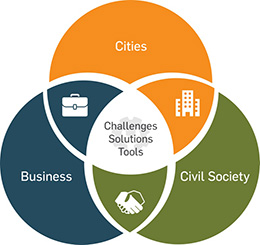
The Melbourne Model – Cross-sectoral collaboration to address complex urban challenges (Source: UN Global Compact Cities Programme)
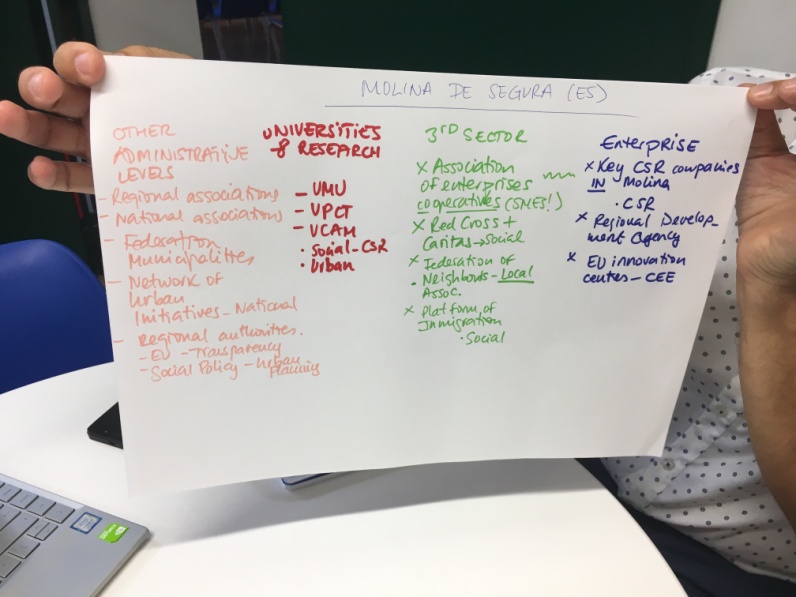
The work has already begun. Our network kicked-off in gorgeous Milan in September, where well-organised site visits taught all participants much about local corporate initiatives that in very practical ways help local communities. Currently the various local baseline study visits are getting under way, problem analyses are being conducted, and first ideas about solutions and small scale actions are being developed. Local multi-sector stakeholder groups are slowly emerging.
”As SMEs we are so busy, so focused on our businesses and on making money – but we can’t do it without having a focus on the outside world. It is crucial to look outside, and around you.”
Jean-Marc Barki - Executive Director, Sealock, French SM
It is already clear that one of the policy focus will target the small-and medium sized enterprises (SME), a sector that often forms the backbone of European urban and regional economies but so far is rather seldom considered as member of the CSR-community. Neighbourhood upgrading appears to be another objective for corporate urban engagement. We are very curious where local path-finding will lead to. One thing is for sure: cities can gain a lot when they turn to their corporate stakeholders. Doing meaningful urban business without spending money does not have to be a fairytale!
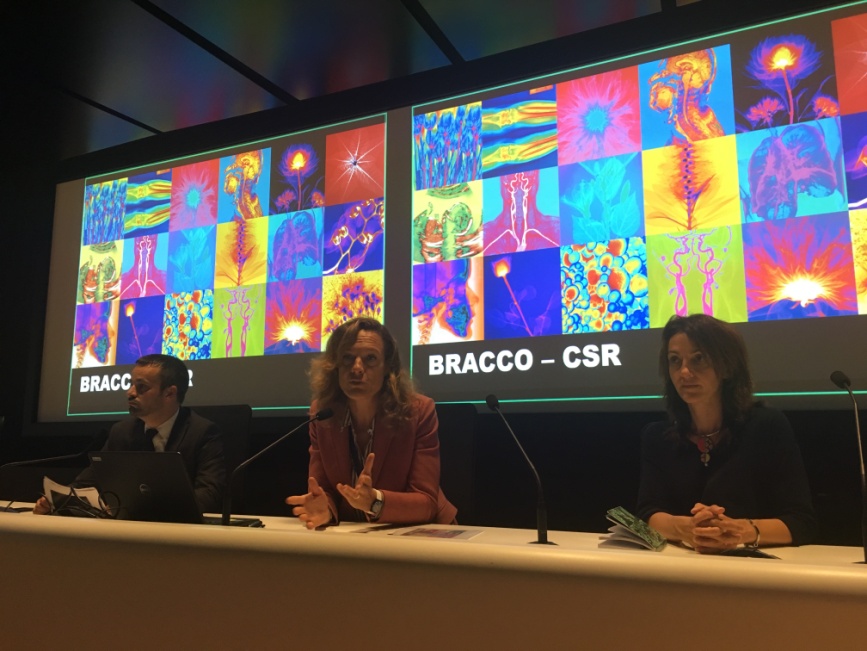
The author acknowledges the creative input from Lead Expert Project team in Milan, with special thanks to Giusy Chierchia for coming up with the title for this article!
 Submitted by Steffen Wetzstein on
Submitted by Steffen Wetzstein on




